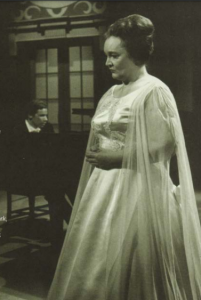Podcast: Play in new window | Download (Duration: 1:43:06 — 111.9MB) | Embed
Subscribe: Spotify | TuneIn | RSS | More
Yesterday was the 100th birthday of the sublime Canadian singer, Lois Marshall (29 January 1925 – 19 February 1997). I was sorry to see that there were very apparently few acknowledgements of this momentous occasion. Three years ago, in a Countermelody series on Great Canadian Singers, Lois Marshall was my first subject. If you haven’t heard of her (which is entirely possible, given the vagaries of posthumous fame and reputation), you are in for an enormous treat. Possessed of a rare musical scrupulousness, an interpretive honestly, directness, and integrity, as well as a finely-honed dramatic sensibility, Lois Marshall, in a better world, would have graced the world’s operatic stages. Alas, she was stricken with polio as a child, and though she managed to gain the ability to walk, staged opera was a genre which she only rarely attempted. Yet she worked with the world’s greatest conductors, among them Toscanini, Stokowski, and Beecham, and was a recitalist celebrated the world over. This episode offers an extended yet partial glimpse of the range and variety of her artistry, and includes recordings of arias by both Purcell and Puccini (the title role of Turandot!), Bach and Beethoven, as well as a dazzling array of recital repertoire from Debussy to folk song arrangements. Fellow Canadians Maureen Forrester and Glenn Gould are also featured. I wanted very much to present a brand-new Lois Marshall episode in hono(u)r of her centennial, and I promise you that is in the works, but in the meantime, I listened early this morning to the first Lois Marshall tribute I posted and I have decided to republish it today as I continue to prepare the brand-new episode. Some of today’s material, in particular an excerpt from Oskar Morawetz’s From the Diary of Anne Frank, which Lois Marshall premiered in 1970, serves as a grim reminder of the United States’ further descent into madness and inhumanity, especially since the inauguration of King Ubu. Through the darkness, however, the glorious voice and humanity of Lois Marshall provide us with an ideal example of our better selves.
Countermelody is a podcast devoted to the glory and the power of the human voice raised in song. Singer and vocal aficionado Daniel Gundlach explores great singers of the past and present focusing in particular on those who are less well-remembered today than they should be. Daniel’s lifetime in music as a professional countertenor, pianist, vocal coach, voice teacher, and journalist yields an exciting array of anecdotes, impressions, and “inside stories.” At Countermelody’s core is the celebration of great singers of all stripes, their instruments, and the connection they make to the words they sing. By clicking on the following link (https://linktr.ee/CountermelodyPodcast) you can find the dedicated Countermelody website which contains additional content including artist photos and episode setlists. The link will also take you to Countermelody’s Patreon page, where you can pledge your monthly or yearly support at whatever level you can afford.



